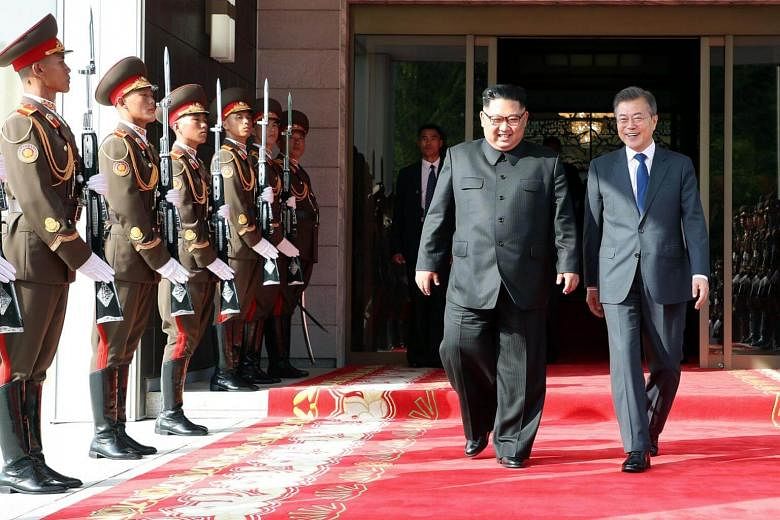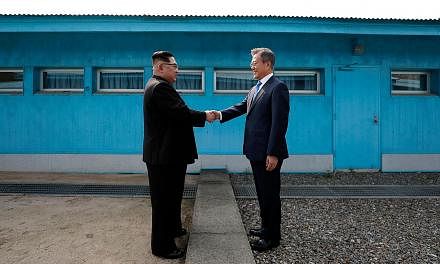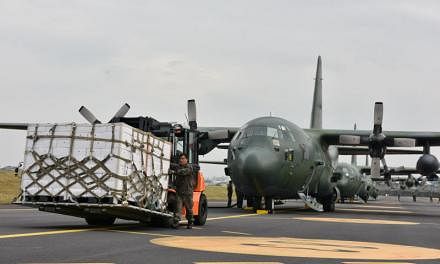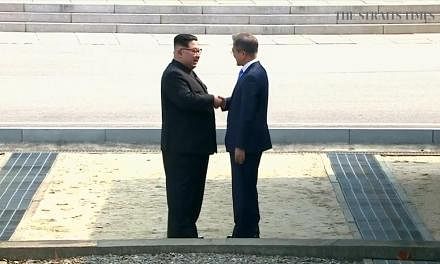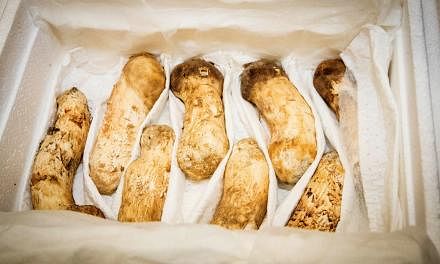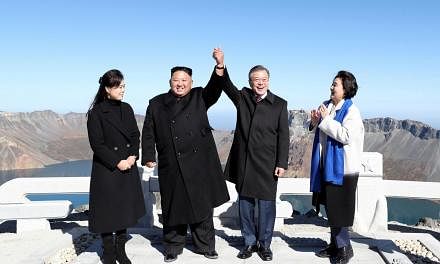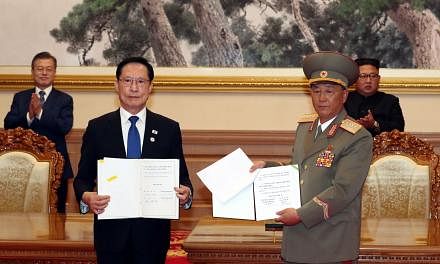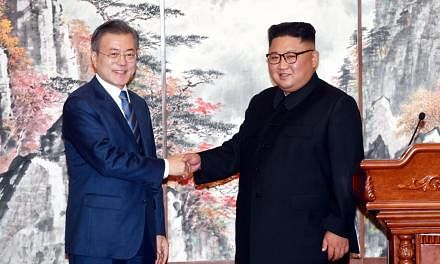SEOUL (REUTERS, AFP) - North and South Korea have agreed to hold a summit in Pyongyang in September, the latest step forward in cross-border ties this year after more high-level talks on Monday (Aug 13), the South's Unification Ministry said.
North Korean leader Kim Jong Un and South Korean President Moon Jae-in met in April and May at the border truce village of Panmunjom, within the demilitarised zone (DMZ) that separates the two Koreas, and agreed that the next summit in autumn would be held in the North Korean capital.
The two Koreas held a fresh round of talks at the DMZ on Monday to discuss the third summit, led by the South's Unification Minister Cho Myoung-gyon and chairman of the North's reunification committee Ri Son Gwon.
Mr Ri said both sides agreed on specific details, including the date for the summit, but declined to elaborate.
However, again without giving details, he said it was important to clear "obstacles" that prevent inter-Korean relations from moving forward as planned.
"If the issues that were raised at the talks aren't resolved, unexpected problems could emerge and the issues that are already on the schedule may face difficulties," Mr Ri said at the end of the meeting.
Mr Cho also refused to specify the problems raised by Mr Ri but said there was talk of humanitarian issues and ways to improve inter-Korean relations.
He said the next summit in Pyongyang would help improve cross-border ties by allowing the two leaders to discuss the North's denuclearisation and how to establish peace on the Korean peninsula.
An official from Seoul's presidential office Cheong Wa Dae said on Monday the trip is likely to take place in mid or late September, reported Yonhap news agency.
"To add a little, I believe (holding the summit) in early September might be a little difficult when considering realistic conditions," Cheong Wa Dae spokesman Kim Eui-kyeom told reporters.
A trip by the President Moon to the North's capital would be the first such visit for more than a decade, as the diplomatic thaw on the peninsula builds.
Mr Moon was part of the South Korean delegation which travelled to Pyongyang for the second inter-Korean summit held in October 2007. He was then the chief of staff to then President Roh Moo-hyun.
Monday's high-level talks were proposed by the North last week as it lashed out at Washington for pushing ahead with sanctions.
"As the Pyongyang meeting of the leaders of the north and south is being discussed, I think talking about the issue will provide answers to the wishes of the people," Mr Ri said in his opening statement before the talks.
Using a proverb describing a very intimate friend to refer to inter-Korean ties, he added: "We have opened an era where we are advancing hand in hand rather than standing in each other's way."
Despite the rapprochement, international sanctions against the North for its nuclear and missile programmes have kept economic cooperation between the two Koreas from taking off, while little progress has been made on the key issue of Pyongyang's denuclearisation.
Mr Cho said it was important that the two Koreas keep "the same mind".
"Many issues will be raised (at the meeting), but I think any problem can be resolved with that mindset," he added.
RAPID RAPPROCHEMENT
Mr Cho addressed the possibility of Pyongyang raising the issue of sanctions to the South, and said: "We will explain our position to the North."
The rapid rapprochement between the two neighbours that began this year paved the way for a landmark meeting between Mr Kim and United States President Donald Trump in Singapore in June.
Cross-border exchanges between the two Koreas have significantly increased since then, with the neighbours planning to hold reunions for war-separated families next week for the first time in three years.
But although Mr Trump touted his summit with Mr Kim as a historic breakthrough, the nuclear-armed North has since criticised Washington for its "gangster-like" demands of complete, verifiable and irreversible disarmament.
Meanwhile the US has urged the international community to maintain tough sanctions on the isolated regime - Seoul has caught three South Korean firms importing coal and iron from the North last year in violation of the measures.
Analysts say Mr Moon could try to act as a mediator between the US and North Korea, having salvaged the Singapore meeting when Mr Trump abruptly cancelled it.
Both leaders are also expected to focus on hammering out a consensus on officially ending the 1950-53 Korean War, which concluded with an armistice instead of a peace treaty, at their planned third summit.
But Mr Harry Harris, the US ambassador to South Korea, said on Monday that it was "too early" for such a declaration, Yonhap reported.
